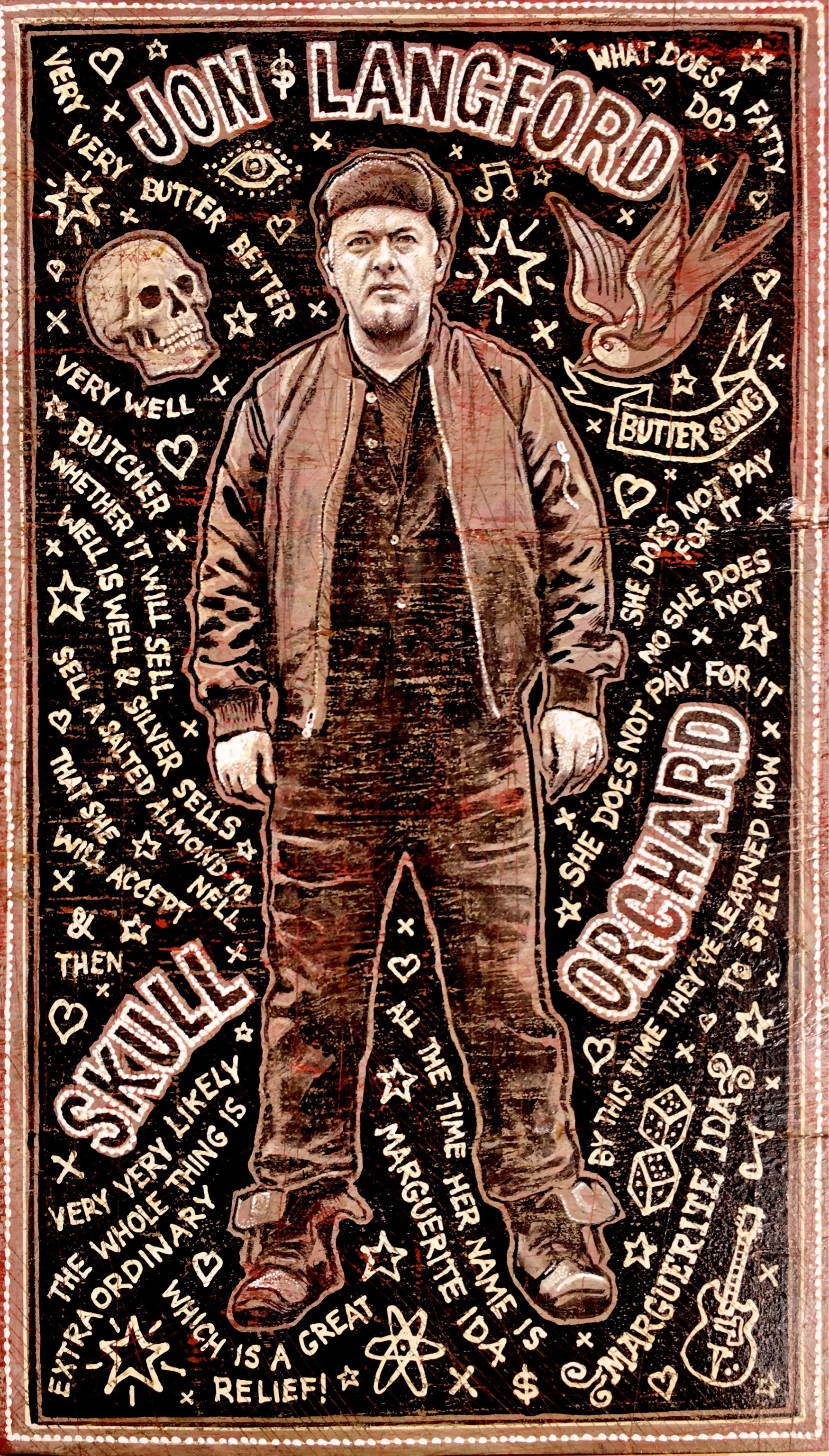The Wild Musical Odyssey of Jon Langford
Image credit: Jon Langford
Jon Langford, iconic Welsh maniac and proud Windy City transplant, struts a dizzying legacy drenched in punk blood and folk tears. In the boozy mists of the 90s, when I lurked in Chicago’s shadowy clubs, searching for music that could fire life into my ragged bones, Langford emerged as a mythic figure of the underground. Where he played, I went, and when I threw all of my worldly possessions into a storage locker and fled to Sweden, probably half of the CDs I took with me were from Langford’s many musical outlets. From the anarchic battle cries of The Mekons—a band that smashed the mold to pieces—to the twang-infused rebellion of The Waco Brothers, Langford has always been a beacon for the outcasts and the downtrodden, a guitar-slinging crusader against the corporate monoliths both in and outside of music.
The man was, and still very much is, a force, a deafening echo of the Big Bang channeled through battered amps and a beer-sodden Stratocaster. Igniting revolutions in 4/4 time, Langford has spent decades on the front lines, painting his protest signs with a fretboard and buckets of sweat, as anyone who’s stood in the front row of one of his shows will readily attest. With a career playing out like a Salvador Dalí-painted map of musical detours, side projects and collaborations, Langford’s relentless output is a middle finger to the idea of artistic complacency. Why stick to one band when you can have half a dozen? Why just sing about love and loss when there’s a whole world of injustice to burn to the fucking ground?
Ranking Jon Langford’s myriad musical escapades isn’t just an exercise in futility; it’s akin to cataloging the different ways to start a fire in the rain. Each project is another chapter in his enduring gospel, where he preaches the good word of rebellion, resilience and the undeniable power of a well-placed chord. In a world that’s increasingly sanitized and soulless, Langford’s work is a reminder of what music can be when it’s unleashed, wild and unafraid, like a stampede of thoughts let loose from the very center of his being. Nonetheless, here is my humble, biased and undercaffienated attempt to rank the many bands of one of my favorite artists.
7. Four Lost Souls
Langford’s pilgrimage to the hallowed halls of Alabama's Muscle Shoals Studio birthed Four Lost Souls. A roots rocking deep dive, Langford's crackling Welsh timbre marries the sultry harmonies of Tawny Newsome and Bethany Thomas with a sharp Southern twang. “I wrote some old Welsh punk-rocker pirate songs and gave them to [the group] to examine for any possible traces of soulfulness,” Langford once explained. Yet, despite its vibrant lineage and the novelty of its cross-continental soul-searching, Four Lost Souls finds itself adrift at the base of my rankings. It’s not for a lack of heart or harmony but because, amidst Langford’s arsenal of auditory insurrections, this album saunters when we expect it to sprint. It's a fascinating journey, to be sure, but in Langford’s universe of musical upheaval, it whispers rather than roars—a testament to exploration, yet a softer skirmish in the grand rebellion of his oeuvre.
6. Men of Gwent
Diving into the sonic depths of Men of Gwent, Jon Langford embarks on a nostalgic odyssey back to his Welsh roots, mining the rich seams of history, mythology and personal memory. Yet, despite its ambitious attempt to bridge the past with the present, this project lands second to last. Why? Because something had to be sixth. Men of Gwent is an intriguing detour, a contemplative stroll through misty valleys and shadowed histories, but amidst the explosive anthems and genre-defying escapades that define Langford’s catalog, this project is the eye of the storm, fascinating in its introspection and depth, yet lacking the visceral punch that marks Langford’s most compelling work. In the wild, unruly feast of Langford’s music, Men of Gwent is the complex, nuanced dish that, while delicious, doesn’t quite satisfy the hunger for the raw, howling abandon that we’ve come to crave.
5. The Pine Valley Cosmonauts
The Pine Valley Cosmonauts are not merely a band—they're a galactic odyssey in boots and spurs, a motley crew of musical renegades hurtling through the cosmos of country music with jet-fueled propulsion. This project is Langford's homage to the titans of twang, yet it's anything but reverential. Conceived as a covers project, they’ve released astonishingly-fresh collections of songs by Johnny Cash, Bob Wills (my fave) and Tom Waits. It's a raucous resurrection of country's outlaw spirit, challenging the gods of Nashville to a duel at high noon. The Cosmonauts dismantle the sanctity of country classics, reengineering them with a defiance that's both a critique and a celebration. They're not just covering songs; they're uncovering the anarchic heart beating within, proving that even the most hallowed country tunes can be blasted into new, uncharted territories. With each track, Langford and his kaleidoscopic posse rewrite the rules of tribute, turning homage into something that feels more like a hijacking. It’s country, but not as we know it—a starry-eyed gallop through the stars, with Langford at the helm.
4. Jon Langford’s Skull Orchard
Jon Langford’s Skull Orchard is where the gritty soul of punk collides with the aching bones of folk, a haunting rendezvous of Langford's own making. After years of bands and side projects, this 1998 album marks his first solo outing, though you could also call it a bloodletting, an intimate exploration into the heart of a man who’s seen the world through the bottom of a whiskey glass and dark, rain-soaked alleys strewn with smashed bottles and broken dreams. Here, Langford strips down to the raw, exposing the marrow of his Welsh roots, entwining them with the rough-hewn fabric of his adopted American landscape. Skull Orchard is a testament to the power of self-reflection, a mirror held up to the artist and the world that shaped him. With a poet’s precision and a punk’s fury, Langford carves out a space that is fiercely personal yet universally resonant, a melodic atlas charting the distance between home and heart. It's a deep dive into the psyche of a man wrestling with the dualities of identity and belonging, making Skull Orchard not just music but a map of the soul, etched in vinyl.
3. The Three Johns
Alongside John Hyatt, Philip “John” Brennan and a drum machine, Langford and co. carved a sonic warpath through the polished veneer of the '80s music scene. This wasn't just a band; it was a razor-edged manifesto wrapped in feedback and spit, a post-punk Molotov cocktail hurled at the glass house of Thatcherite Britain. Their music—a cacophony of jagged guitars, sardonic wit and a slashing tempos that could incite a riot in a monastery—was an antidote to apathy, a wake-up call delivered with a sneer and a stomp. The Three Johns didn't play songs; they detonated them, each track a critique of consumerism, politics and the banality of mainstream culture. In an era of synth-pop and shoulder pads, they were the scratchy conscience of the underground, reminding us all that music, when wielded like a blade, can cut through the thickest haze of bullshit.
2. The Waco Brothers
One of my top ten all-time favorite bands, putting these guys down at number two feels Biblically wrong. The Waco Brothers, a band that crashes through the veneer of American roots music with the force of a freight train hijacked by a leering pack of outlaws gacked on trucker speed, stand as a testament to Jon Langford's insatiable appetite for musical insurrection. This is not country music for people who wear $200 denim shorts and drink White Claw; it's a whiskey-soaked, hip-shaking blowout for people entirely unafraid to see the clock hit 2 a.m. on a weeknight. In the hands of Langford and his cohorts, country music — in its many noble guises — becomes an vehicle for dissecting the American dream even as they pay homage to its raw, untamed spirit. They're outlaws in the truest sense, riding on the edges of genres, where the echoes of Cash and Strummer blend into a battle hymn for the disenchanted. The Waco Brothers are a musical two-by-four soaring through the glass window of complacency, with an explosive blend of honky-tonk and garage rock fury. Once you’ve seen them live, up close and personal, there’s simply no turning back.
1. The Mekons
The Mekons emerged from the punk primordial soup of 1977 Leeds, not just to play music but to set the record—and the establishment—ablaze. If Lester Bangs joked they were rock 'n' roll's most revolutionary act, it’s because under the jest lay an uncomfortable truth. These art school misfits, armed with more wit than commercial sense and a political edge sharp enough to draw blood, refused to march in step with the music industry's relentless parade toward oblivion.
The Mekons are a rare breed, a band that treated genres as mere suggestions, hopping from punk to country, from experimental noise to electronic folk, without ever losing their essence or their edge. From the sarcastic sneer of Never Been in a Riot to the electronic pulses of Me, they've remained unapologetically political, channeling their Marxism with the ease of barroom philosophers rather than academic pontificators. Their fanbase, though not vast, is fiercely loyal, a small army of devotees who see The Mekons not just as a band but as a sacred institution. For over four decades, they’ve navigated the shifting sands of the music industry without ever losing sight of their initial manifesto. In an age of musical mercenaries, The Mekons stand as defiant holdouts, revolutionaries who’ve never stopped believing that rock 'n' roll can change the world, one chord at a time.


